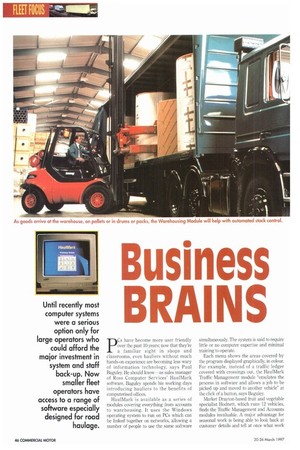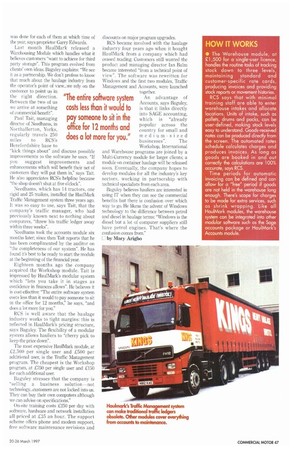Business BRAINS
Page 48

Page 49

If you've noticed an error in this article please click here to report it so we can fix it.
pL:s have become more user friendly over the past 10 years; now that they're a familiar sight in shops and classrooms, even hauliers without much hands-on experience are becoming less wary of information technology, says Paul
Baguley. He should know as sales manager of Ross Computer Services' HaulMark software, Baguley spends his working days introducing hauliers to the benefits of computerised offices.
HaulMark is available as a series of modules covering everything from accounts to warehousing. It uses the Windows operating system to run on PCs which can be linked together on networks, allowing a number of people to use the same software simultaneously. The system is said to require little or no computer expertise and minimal training to operate.
Each menu shows the areas covered hy the program displayed graphically, in colour. For example, instead of a traffic ledger covered with crossings out, the HaulMark Traffic Management module "emulates the process in software and allows a job to be picked up and moved to another vehicle" at the click of a button, says Baguley.
Market Drayton-based fruit and vegetable specialist Hodnett, which runs 12 vehicles, finds the Traffic Management and Accounts modules invaluable. A major advantage for seasonal work is being able to look back at customer details and tell at once what work was done for each of them at which time of the year, says proprietor Garry Edwards.
Last month HaulMark released a Warehousing Module which handles what it believes customers "want to achieve for third party storage". This program evolved from clients' own ideas. Baguley explains: "We see it as a partnership. We don't profess to know that much about the haulage industry from the operator's point of view...we rely on the customer to point us in the right direction. Between the two of us we arrive at something of commercial benefit".
Paul Tait, managing director of Needhams, in Northallerton, Yorks, regularly travels 250 miles to RCS's Herefordshire base to "kick things about" and discuss possible improvements to the software he uses. "If you suggest improvements and enhancements which will benefit their net of customers they will put them in," says Tait. He also appreciates RCS's helpline because "the shop doesn't shut at five o'clock".
Needhams, which has 14 tractors, one rigid and 25 trailers, installed the HaulMark Traffic Management system three years ago. It was so easy to use, says Tait, that the company's traffic manager, who had previously known next to nothing about computers, "threw his traffic ledger away within three weeks".
Needhams took the accounts module six months later; since then Tait reports that he has been complimented by the auditor on "the completeness of our system". He has found it's best to be ready to start the module at the beginning of the financial year.
Eighteen months ago the company acquired the Workshop module. Tait is impressed by HaulMark's modular system which "lets you take it in stages as confidence in finances allows". He believes it is cost-effective: "The entire software system costs less than it would to pay someone to sit in the office for 12 months," he says, "and does a lot more for you."
RCS is well aware that the haulage industry works to tight margins: this is reflected in HaulMark's pricing structure, says Baguley. The flexibility of a modular system allows hauliers to "cherry pick to keep the price down".
The most expensive HaulMark module, at £2.500 per single user and £500 per additional user, is the Traffic Management program. The cheapest is the Workshop program, at .£750 per single user and £150 for each additional user.
Baguley stresses that the company is "selling a business solution —not technology...customers are not locked into us. They can buy their own computers although we can advise on specifications" On-site training costs £250 per day with software, hardware and network installation all priced at £35 an hour. The support scheme offers phone and modem support, free software maintenance revisions and discounts on major program upgrades.
RCS became involved with the haulage industry four years ago when it bought HaulMark from a company which had ceased trading. Customers still wanted the product and managing director Ian Balm became interested "from a technical point of view". The software was rewritten for Windows and the first two modules, Traffic Management and Accounts, were launched together.
An advantage of Accounts, says Baguley, is that it links directly into SAGE accounting, which is "already popular across the country for small and medium-sized businesses". The Workshop, International and Warehouse programs are joined by a Multi-Currency module for larger clients; a module on container haulage will be released soon. Eventually, the company hopes to develop modules for all the industry's key sectors, working in partnership with technical specialists from each area.
Baguley believes hauliers are interested in using IT when they can see the commercial benefits but there is confusion over which way to go. He likens the advent of Windows technology to the difference between petrol and diesel in haulage terms: "Windows is the diesel but a lot of computer suppliers still have petrol engines. That's where the confusion comes from."
L: by Mary Arigho
















































































































